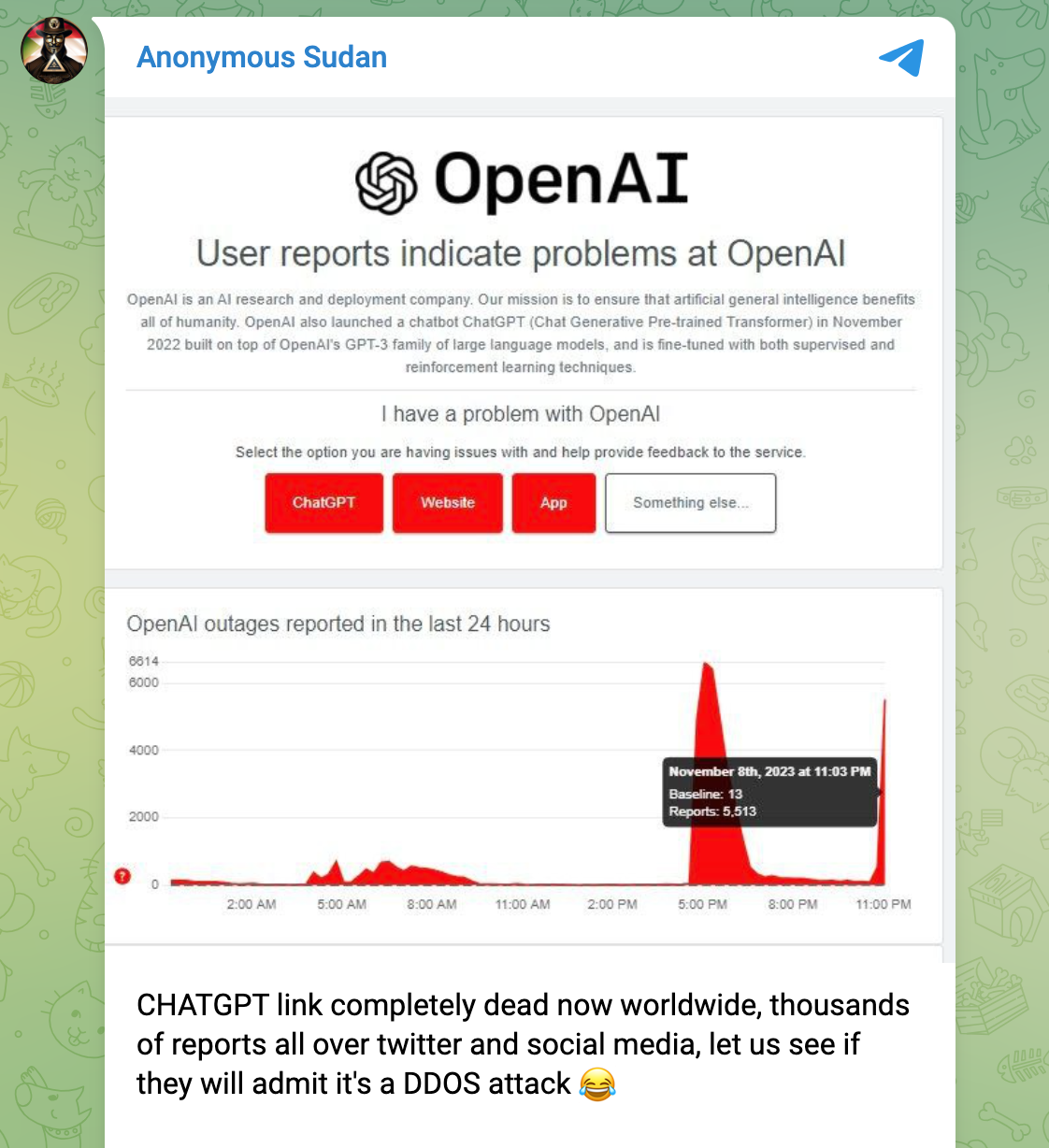ChatGPT and OpenAI’s API experienced periodic outages on 8 November due to a distributed denial-of-service (DDoS) attack. Hacktivist group Anonymous Sudan claimed responsibility, citing OpenAI’s cooperation with Israel and bias in ChatGPT. Other OpenAI models, Bard and Claude, also faced capacity constraints. The incident highlights the vulnerability of society as we become increasingly dependent on AI tools. (49 words)

OpenAI’s ChatGPT Targeted by DDoS Attacks
On 8 November, users worldwide experienced difficulties accessing ChatGPT due to periodic outages. OpenAI’s status page confirmed that both ChatGPT and its API were affected. The unexpected surge in usage of OpenAI’s new features surpassed their expectations, leading to the suspicion that the cause of the outages was more than just high demand.
Eventually, OpenAI acknowledged that the outages were a result of a distributed denial-of-service (DDoS) attack. This type of attack involves overwhelming an online service with a flood of requests to exhaust its resources.
Hacktivist Group Anonymous Sudan Claims Responsibility
Although OpenAI did not directly attribute the attack to any specific group, hacktivist group Anonymous Sudan claimed responsibility for the DDoS attack. Despite their name, Anonymous Sudan is believed to be a group of Russian hackers. Their attacks, motivated by political and religious reasons, began in January of the same year.
In a Telegram post, the group stated that their reasons for the attack included OpenAI’s cooperation with Israel, the CEO’s willingness to invest more in Israel, and meetings with Israeli officials. They also criticized the use of AI in weapon development and by intelligence agencies, including Mossad. The group expressed a general bias in ChatGPT and called for its correction.
Other AI Tools Affected
Users who attempted to switch to alternative AI tools, such as Bard or Claude, also encountered difficulties. Claude, for example, responded with an error message due to unexpected capacity constraints. It is unclear whether these tools were specifically targeted, but the sudden influx of ChatGPT users likely strained their servers.
The Importance of AI Risk Management
This attack on OpenAI highlights a significant risk associated with AI. As AI tools become more advanced and society becomes increasingly reliant on them, we also become more vulnerable when they fail. Cyber attacks continue to pose a threat, and AI tools can make it easier for attackers to cause substantial financial damage online.
Using AI to Evolve Your Company
If you want to stay competitive and leverage AI to transform your company, consider the lessons learned from OpenAI’s experience. Here are practical steps to integrate AI into your operations:
- Identify Automation Opportunities: Locate key customer interaction points that can benefit from AI.
- Define KPIs: Ensure your AI initiatives have measurable impacts on business outcomes.
- Select an AI Solution: Choose tools that align with your needs and offer customization.
- Implement Gradually: Begin with a pilot, gather data, and expand AI usage judiciously.
For AI KPI management advice and continuous insights into leveraging AI, connect with us at hello@itinai.com. Stay updated on our Telegram channel t.me/itinainews or follow us on Twitter @itinaicom.
Spotlight on a Practical AI Solution: AI Sales Bot
Discover how AI can redefine your sales processes and customer engagement. Explore the AI Sales Bot at itinai.com/aisalesbot. This tool is designed to automate customer engagement 24/7 and manage interactions across all stages of the customer journey.
List of Useful Links:
- AI Lab in Telegram @aiscrumbot – free consultation
- OpenAI says ChatGPT was the target of DDoS attacks
- DailyAI
- Twitter – @itinaicom




























